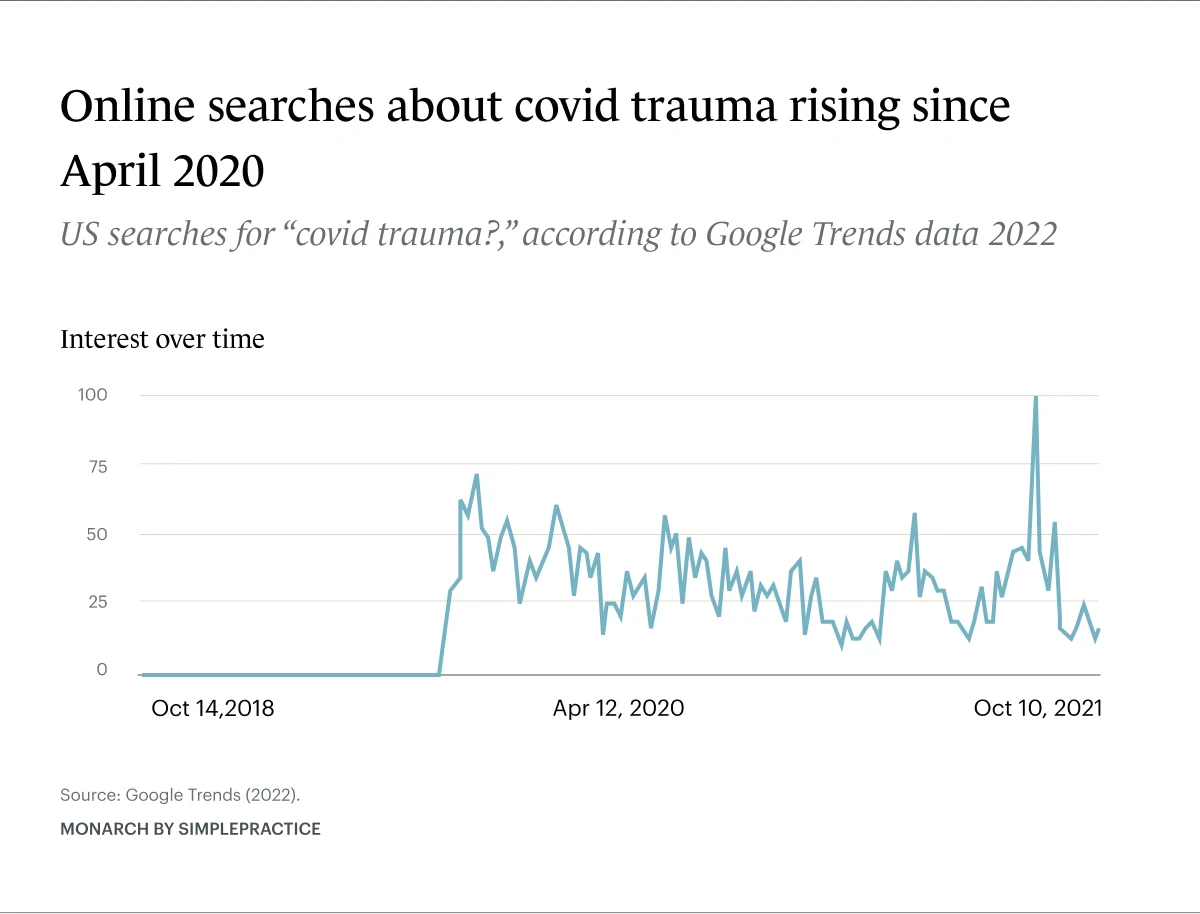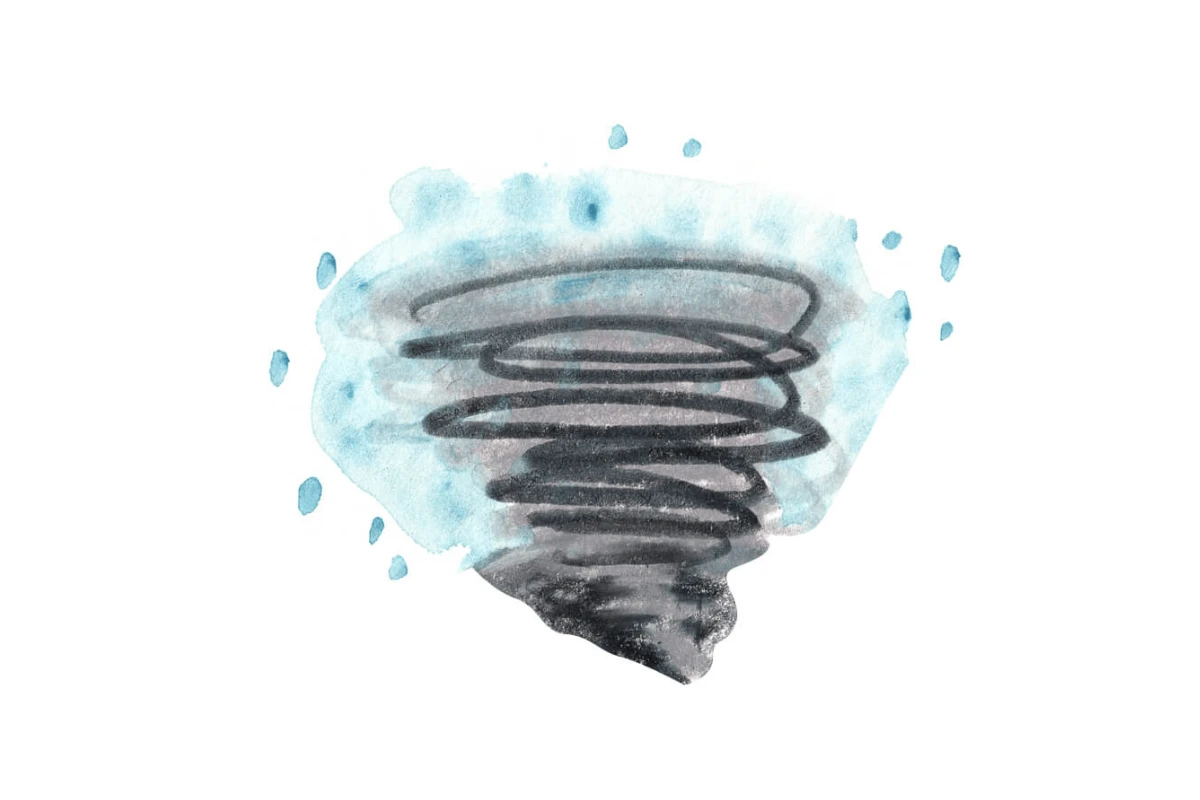The idea of a global pandemic of the scale that we've all experienced may have initially felt like something out of science fiction.
But, as the spring of 2020 turned into the summer of 2021, it was clear COVID-19 wasn’t going anywhere.
Actually, the virus was going everywhere.
While many of us humans spent much more time going nowhere and staying at home more than we ever had before.
I was mourning the loss of my life as I had known it...I was experiencing trauma.
Businesses shut down, millions of people worked from home, healthcare workers stayed on duty round-the-clock, over 22 million Americans lost their jobs, students missed out on in-person classes, proms, and graduation ceremonies, people couldn’t pay their rents or mortgages, over 80 million Americans were infected with the novel Coronavirus, and worst of all, over 6 million people died of COVID-19 worldwide—including one million Americans.
In the first weeks of COVID-19, I experienced a flood of emotions that I couldn’t put my finger on.
It was anxiety, yes, but there was also a heavy weight clouding my day-to-day existence.
This emotion, it turned out, was grief.
I was mourning the loss of my life as I had known it. I was experiencing trauma.
COVID-19, trauma, and PTSD
It appears this confusing and stress-filled set of years created something called "collective trauma" or "mass trauma."
California's first-ever surgeon general—Dr. Nadine Burke Harris—told The Guardian in February 2022 she considered it "The greatest collective trauma of a generation."
A December 2021 Georgia State University study provides evidence that the COVID-19 pandemic can be considered "a unique traumatic stressor."
“Among our findings is that the experience of COVID-19 is a traumatic stress," said the study's lead author Dr. Jeff Ashby, Ph.D, Co-Director of the Ken Matheny Center for the Study of Stress, Trauma, and Resilience at Georgia State University.
It appears this confusing and stress-filled set of years created something called "collective trauma" or "mass trauma."
"It isn’t just triggering earlier trauma, it’s a traumatic experience in and of itself,” he explains.
Consequently, if you're feeling symptoms of "COVID trauma" or "pandemic PTSD," you're far from alone.
Americans' curiosity about "covid trauma" spiked in the number searches shown on Google Trends in January and February 2022.
“We used to think about trauma as something in the background. Trauma-informed care providers couldn’t always be sure who had experienced a trauma,” said Ashby.
“The pandemic is different. Although COVID-19 has not impacted all people equally or in the same ways, it is a unique shared experience," he explained. "We are all compromised by this prolonged and ongoing traumatic stress, even if we haven’t experienced PTSD.”
Read on, to find out what to do if you've personally been impacted.

Defining trauma
A word on trauma: Historically, clinicians and mental health professionals have had a complicated relationship with what constitutes trauma.
Some believe that trauma only occurs when there is an imminent threat of death or serious injury.
Others believe trauma can occur with less serious events, including bullying, job loss, or divorce.
So, how do we know if we're experiencing symptoms of trauma from COVID-19?
Whichever definition we subscribe to, it still makes sense that an ongoing event that changes the functioning of our day-to-day lives for years is traumatic.
The symptoms of post-traumatic stress disorder or PTSD can take months after exposure to trauma to appear.
So, how do we know if we're experiencing symptoms of trauma from COVID-19?

5 signs of 'COVID trauma' or 'pandemic PTSD'
Trauma can present differently among individuals.
Maybe you've experienced some of these five symptoms:
1. Anxiety and panic attacks
Feeling on edge, or experiencing intense fear, can be symptoms of trauma.
Anxiety and panic may develop without warning or any obvious signs, and anxiety's one of the most common symptoms clients report after experiencing trauma.
2. Physical problems
Trauma causes the nervous system to overreact, resulting in a chronic state of stress and arousal.
As the nervous system functions on high alert, our bodies react with physical symptoms, such as chronic pain, migraines, fatigue, and nausea.
During the height of COVID-19, many of my clients and colleagues reported feeling tired and exhausted with little energy to do anything.
3. Irritability
Trauma can affect our arousal and reactivity, resulting in angry outbursts and, in some cases, aggressive behaviors.
Even benign conversations can erupt into battles when people are tested to their limits.
The COVID-19 pandemic has proven to be one of the most divisive disasters our country has seen in decades.
4. Feeling emotionally overwhelmed
Overwhelming emotions can affect our ability to cope after trauma.
Feelings that outweigh the ability to manage them can make it difficult to focus or concentrate.
This can cause us to isolate, and we may fail to take care of ourselves and continue our self-care routines.
It would be difficult to identify one person who hasn’t been overwhelmed by the sheer dismay of day-to-day life in quarantine.
5. Loss of a sense of the future
Trauma can result in feeling as though your life can be cut short at any moment.
Loss of trust or faith in the world can limit our motivation to make plans for the future.
Students I’ve worked with over the past year expressed little interest in their futures as COVID-19 raged on and changed their lives forever.

How to heal from trauma
There are several recommendations that mental health therapists advise to help people heal from "COVID trauma" and other traumatic experiences.
Most important is to develop healthy coping skills.
Consider acknowledging your feelings, taking time out of a busy schedule, and engaging in positive self-talk and self-compassion.
Getting enough sleep, exercising, eating a balanced diet, and limiting alcohol consumption are essential to your self-care routine.
Research suggests there are other ways to cope with trauma, such as:
Animal-assisted therapy. Studies have found that owning a dog or horse can have many positive health benefits, including reducing trauma symptoms.
Art therapy. In studies of people who experienced trauma, art therapy was found to significantly reduce the symptoms and severity.
Practicing mindfulness. Experts have found that practicing mindfulness or getting mindfulness-based therapy (MBT) can help increase a person’s ability to navigate emotional and physical stress brought on by a traumatic experience.

There are other surprising symptoms of trauma, and these signs and any others that cause distress or affect your capacity to function daily should not be ignored.
As with any mental health crisis, the best way to determine whether you've experienced "COVID trauma" is to speak with a therapist who specializes in treating clients with trauma.
Find a therapist who specializes in trauma
The Monarch Directory by SimplePractice can connect you with therapists and counselors witch expertise in treating trauma.
You can quickly and easily view their availability and book a therapy session. Many offer free 15-minute initial consultations and in-person or teletherapy video sessions.
If you have health insurance coverage, you can also browse therapists who accept your insurance.
There are many proven treatments to improve the symptoms of trauma, including cognitive behavioral therapy (CBT), cognitive processing therapy (CPT), mindfulness-based therapy (MBT), and eye movement desensitization and reprocessing (EMDR) therapy.
READ NEXT: Am I Burning Out? How to Bounce Back
The Monarch Directory by SimplePractice can help you find a therapist near you who specializes in trauma.










